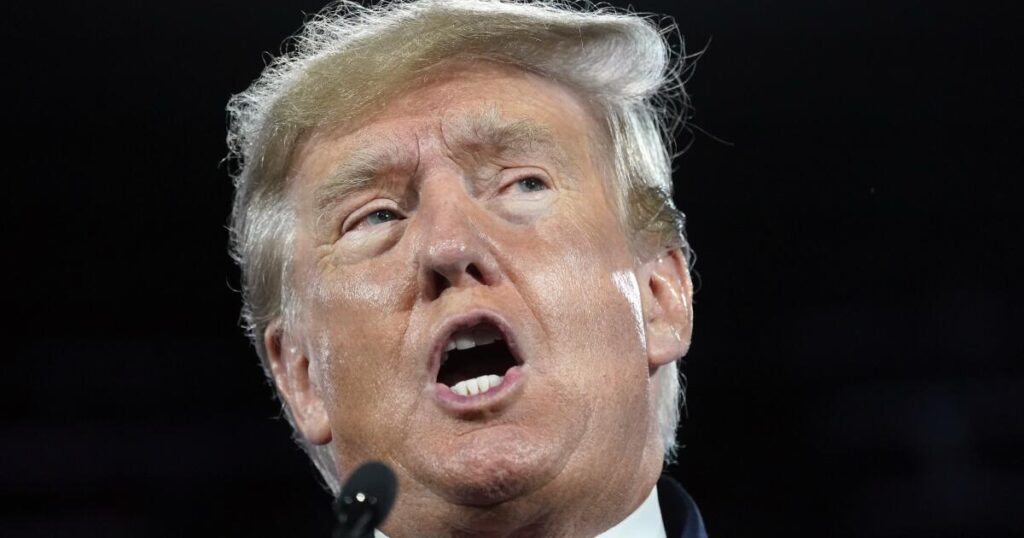The Supreme Court announced Wednesday that it will hear arguments and rule on whether former President Trump is immune from prosecution over the Jan. 6 mob attack on the U.S. Capitol.
Even if the justices ultimately rule against Trump, their decision to intervene now will delay his trial by several months, casting doubt on whether the criminal case can go to a jury before the fall as the campaign accelerates.
The justices said they would hear arguments the week of April 22.
They said they would decide the following question: whether — and if so, to what extent — the former president enjoyed immunity from criminal prosecution for conduct allegedly involving official business during his term.
The judges said nothing more.
It remains unclear whether some justices believe Trump has a strong claim to immunity for his alleged official actions as president, or instead whether they are simply following the court's normal rules to resolve a key constitutional question.
Many legal experts have ridiculed Trump's claim of absolute immunity for his actions as president.
In one of the court hearings, Trump's lawyer confirmed that the former president could be protected from prosecution even if he asked the US Navy team to kill one of his political rivals.
Special counsel Jack Smith said Trump is accused of crimes that “strike at the heart of our democracy.” The President's alleged criminal scheme to overturn the election and thwart the peaceful transfer of power to his successor should be the last place to recognize a new form of absolute immunity from federal criminal law.
A grand jury in Washington has indicted Trump on four criminal charges stemming from his efforts — some public, some behind closed doors — to prevent Joe Biden from certifying his victory in the 2020 election.
In seeking to block a trial, Trump's lawyers argued that the former president is protected from criminal charges because of his “official acts” while in office.
US District Court Judge Tanya Chutkan disagreed, saying that the Constitution does not provide absolute immunity to former presidents. The US Court of Appeals for the DC Circuit affirmed the ruling by a 3-0 decision.
On February 12, Trump's lawyers filed an emergency appeal urging judges to keep the case on hold until their appeals are heard. Trump's claim that presidents enjoy absolute immunity from criminal prosecution for their official actions represents a new, complex and critically important question that requires careful consideration on appeal, they said. …If impeachment of the president is upheld, such trials will become more frequent and increasingly common, leading to destructive cycles of recrimination.
They noted that one Supreme Court rule calls for granting review in a case when “the appellate court has decided an important question of federal law that has not been settled, but should be settled under that law.” [Supreme] court.”
In December, the special counsel cited that rule to urge the justices to hear Trump's case immediately. “It is of imperative public importance that [his] Smith said at the time that “immunity claims should be resolved by” the Supreme Court.
But the judges rejected his appeal for speedy ruling and referred the case to the US Court of Appeals, which then ruled against Trump.
This month, the special counsel partially reversed course and said the justices should refuse to rule on Trump's appeal, clearing the way for the Jan. 6 trial to begin this spring. Granting the review now “threatens to frustrate the public interest in a prompt and fair ruling,” he said.
Alternatively, he said the justices should hear the case in March and decide on an expedited timeline.
The special counsel did not mention the election campaign or Trump's status as the front-runner to win the Republican presidential nomination.
But if the trial is delayed until late summer, the special counsel could run afoul of the Justice Department's policy of avoiding prosecutions that could affect the election.
Two years ago, Atty. General Merrick Garland issued a memorandum declaring that “partisan politics should play no role in the decisions of … prosecutors regarding any criminal investigations or charges.” … Prosecutors may never choose the timing of public statements … or any other action in any matter or issue for the purpose of influencing any election. Such a purpose, or the appearance of such a purpose, is incompatible with [Justice] Department mission.”
Harvard law professor Jack Goldsmith, writing in the Lawfare blog, criticized his characterization of the special counsel's “rush to prosecution” and said Smith might run afoul of the Justice Department's policy of avoiding election interference.
“Polls show that Trump would be harmed, and Joe Biden would benefit, if Biden’s Justice Department convicts Trump of a crime before the election,” said Goldsmith, a senior fellow at the conservative Hoover Institution.
Lawyers for Alabama and 21 other Republican-led states urged the court to slow down when considering Trump's appeals. “Their states represent millions of Americans, many of whom are concerned that the timing of this trial was calculated to silence or imprison President Biden’s political rival,” they said.
They said the court should not “give the green light to the prosecution to move forward at breakneck speed and prosecute the front-runner” for the Republican presidential nomination “in the run-up to the election.”
But a group of former Republican officials, including former Sen. John Danforth of Missouri, said supporting immunity for Trump could increase the possibility of a military coup in the future.
“The last thing that would serve the nation or the presidency would be to encourage presidents who lose re-election to engage in violations of federal criminal law…to prevent the vesting of executive power” to their rightful successor, the former officials wrote in a friend. -Court summary.
“If it qualifies for absolute immunity, the precedent would encourage a future president to violate federal criminal laws by deploying the military and armed federal agents in efforts to change the results of the presidential election.”
